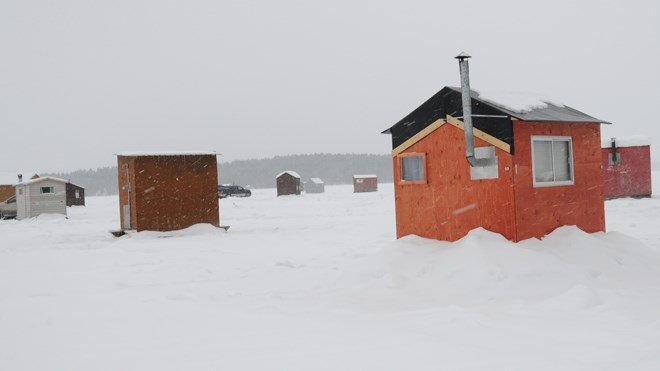The Ministry of Natural Resources and Forestry has issued a release for those who are itching to get outside for some ice fishing or snowmobiling to take care on frozen lakes.
Ice conditions can be deceptive and variable and it's important to remember:
- Ice does not freeze at a uniform thickness across most lakes and rivers. This can be hazardous at the start of the winter season when near-shore ice is often much thicker and safer than ice further out. Check thickness regularly with a spud bar or auger as you move further out on the ice.
- Not all ice is created equal. Ice that has formed over flowing water, springs, pressure cracks, old ice holes or around the mouths of rivers and streams can be weaker than surrounding ice.
- Clear blue ice is the strongest. White or opaque ice is much weaker. Ice that has a honeycombed look, common during thaws or in the spring, should be avoided.
- Travelling on frozen lakes or rivers with snowmobiles or vehicles can be dangerous and precautions must be taken. At least 20 centimetres (eight inches) of clear blue ice is required for snowmobiles and 30 centimetres (12 inches) or more is needed for most light vehicles. This thickness should be doubled if the ice is white or opaque.
- Heavy snow on a frozen lake or river can insulate the ice below and slow the freezing process.
So far this winter the weather has not been cold or consistent enough in the Northeast and many lakes in the Greater Sudbury area are still not safe enough to be walked on.
Windy Lake still has open water and is unsafe according the MNRF, the same goes for Whitewater Lake and Lake Wanapitei.
“We just haven't had the weather for these lakes to freeze completely,” said Heather Pridham, MNRF.
“Some smaller lakes can support walking, but most of the larger lakes still have open water and are unsafe.”
According to Pridham there is no benchmark for temperature or length of extended cold weather that would deem lakes safe for ice fishing or snowmobiles.
“There's so many factors such as snow or wind that can affect how the water freezes,” said Pridham.
“Your best bet if you're heading out fishing is to check with the operators at the bait shops because they're out there every day checking the ice.”
Before Venturing Out:
- Check ice conditions with local ice hut operators or other anglers.
- Let others know where you’re planning to fish and when you plan to return.
- Appropriate clothing and equipment are critical to safety and comfort. Many anglers wear floatation suits and carry a set of ice picks.
- Register your ice hut, where required. There is no ice hut registration in northwest Ontario except for Lake Superior (Fisheries Management Zone 9).
- Learn about ice fishing and ice hut removal and register your ice fishing hut at ontario.ca/icefishing.
- Check the Ontario Fishing Regulations Summary or contact your local ministry office for registration requirements.
- If you’re heading out on a snowmobile, make sure you’re being safe and responsible.
